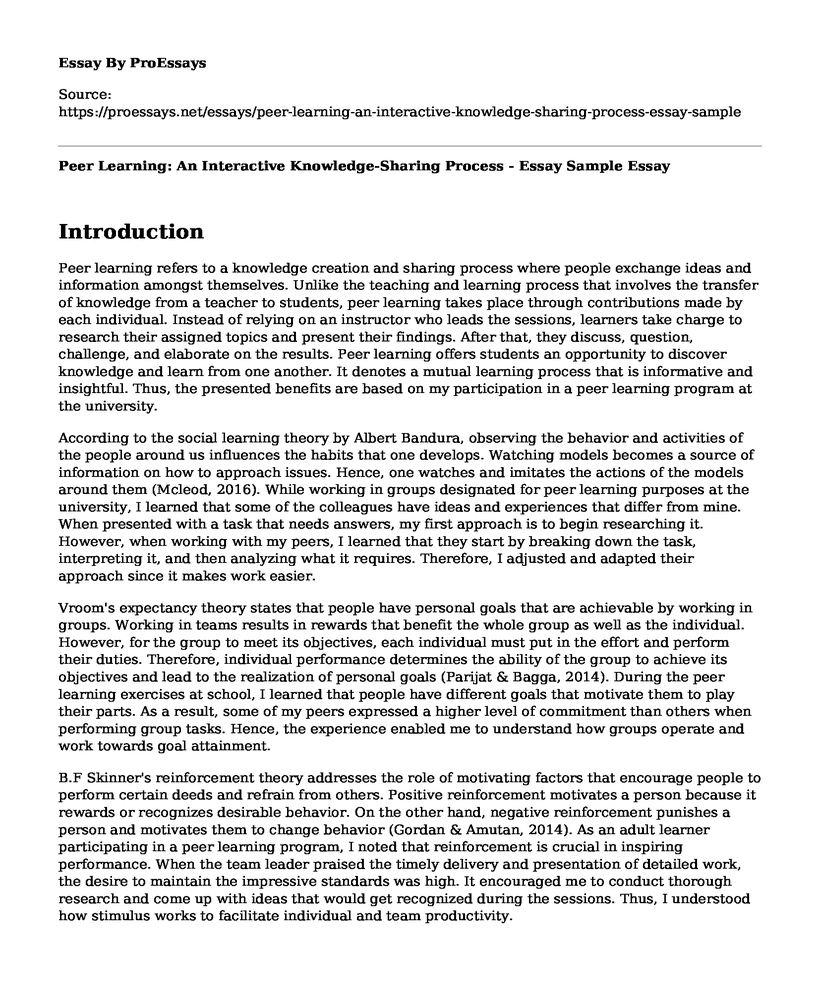Introduction
Peer learning refers to a knowledge creation and sharing process where people exchange ideas and information amongst themselves. Unlike the teaching and learning process that involves the transfer of knowledge from a teacher to students, peer learning takes place through contributions made by each individual. Instead of relying on an instructor who leads the sessions, learners take charge to research their assigned topics and present their findings. After that, they discuss, question, challenge, and elaborate on the results. Peer learning offers students an opportunity to discover knowledge and learn from one another. It denotes a mutual learning process that is informative and insightful. Thus, the presented benefits are based on my participation in a peer learning program at the university.
According to the social learning theory by Albert Bandura, observing the behavior and activities of the people around us influences the habits that one develops. Watching models becomes a source of information on how to approach issues. Hence, one watches and imitates the actions of the models around them (Mcleod, 2016). While working in groups designated for peer learning purposes at the university, I learned that some of the colleagues have ideas and experiences that differ from mine. When presented with a task that needs answers, my first approach is to begin researching it. However, when working with my peers, I learned that they start by breaking down the task, interpreting it, and then analyzing what it requires. Therefore, I adjusted and adapted their approach since it makes work easier.
Vroom's expectancy theory states that people have personal goals that are achievable by working in groups. Working in teams results in rewards that benefit the whole group as well as the individual. However, for the group to meet its objectives, each individual must put in the effort and perform their duties. Therefore, individual performance determines the ability of the group to achieve its objectives and lead to the realization of personal goals (Parijat & Bagga, 2014). During the peer learning exercises at school, I learned that people have different goals that motivate them to play their parts. As a result, some of my peers expressed a higher level of commitment than others when performing group tasks. Hence, the experience enabled me to understand how groups operate and work towards goal attainment.
B.F Skinner's reinforcement theory addresses the role of motivating factors that encourage people to perform certain deeds and refrain from others. Positive reinforcement motivates a person because it rewards or recognizes desirable behavior. On the other hand, negative reinforcement punishes a person and motivates them to change behavior (Gordan & Amutan, 2014). As an adult learner participating in a peer learning program, I noted that reinforcement is crucial in inspiring performance. When the team leader praised the timely delivery and presentation of detailed work, the desire to maintain the impressive standards was high. It encouraged me to conduct thorough research and come up with ideas that would get recognized during the sessions. Thus, I understood how stimulus works to facilitate individual and team productivity.
Overall, peer learning experience was informative. Before participating in the exercise, I perceived group work as exhausting due to the dynamics of coordinating tasks with different people. However, peer learning changed my perspective, given the autonomous yet interdependent nature of the groups we used. By coming together and playing an active role in knowledge creation and dissemination, my peers and I learned how to collaborate toward attaining specific outcomes. Due to the differences that exist among my peers at the institution, I learned about motivation and its impact on individual and team productivity.
References
Gordan, M., & Amutan, K. I. (2014). A review of BF Skinner's 'Reinforcement Theory of Motivation. International Journal of Research in Education Methodology, 5(3), 680-688. https://doi.org/10.24297/ijrem.v5i3.3892
Mcleod, S. (2016). Albert Bandura | Social Learning Theory | Simply Psychology. Retrieved 31 March 2020, from https://www.simplypsychology.org/bandura.html
Parijat, P., & Bagga, S. (2014). Victor Vroom's expectancy theory of motivation-An evaluation. International Research Journal of Business and Management, 7(9), 1-8. file:///C:/Users/user/Downloads/131-264-1-SM.pdf
Cite this page
Peer Learning: An Interactive Knowledge-Sharing Process - Essay Sample. (2023, May 05). Retrieved from https://proessays.net/essays/peer-learning-an-interactive-knowledge-sharing-process-essay-sample
If you are the original author of this essay and no longer wish to have it published on the ProEssays website, please click below to request its removal:
- Paper Sample: Charter Schools Versus Public Schools in Chicago
- Reflection of the Twelve Weeks Learning Process - Essay Sample
- Essay Sample on Standardized Testing
- Pennsylvania Department of Education Website Summary Reflection Paper
- What Can Be Done to Improve the College Graduation Rate? Essay
- Essay Example on Rising Student Loans and College Tuition: A Causal Analysis
- Bilingual Education Benefits: Examining Spanish-Speaking ELL Writing - Essay Sample







